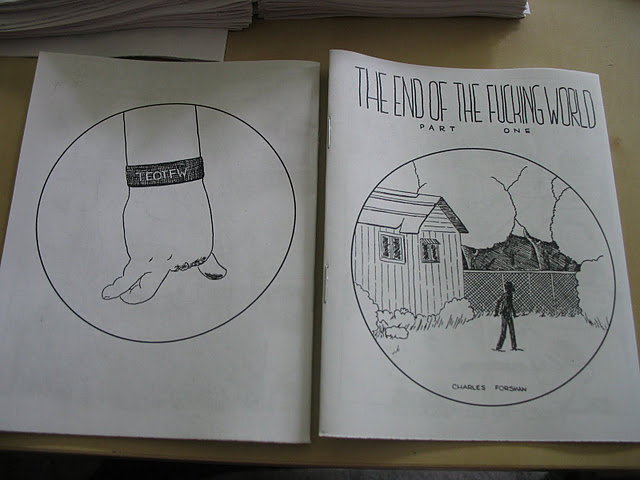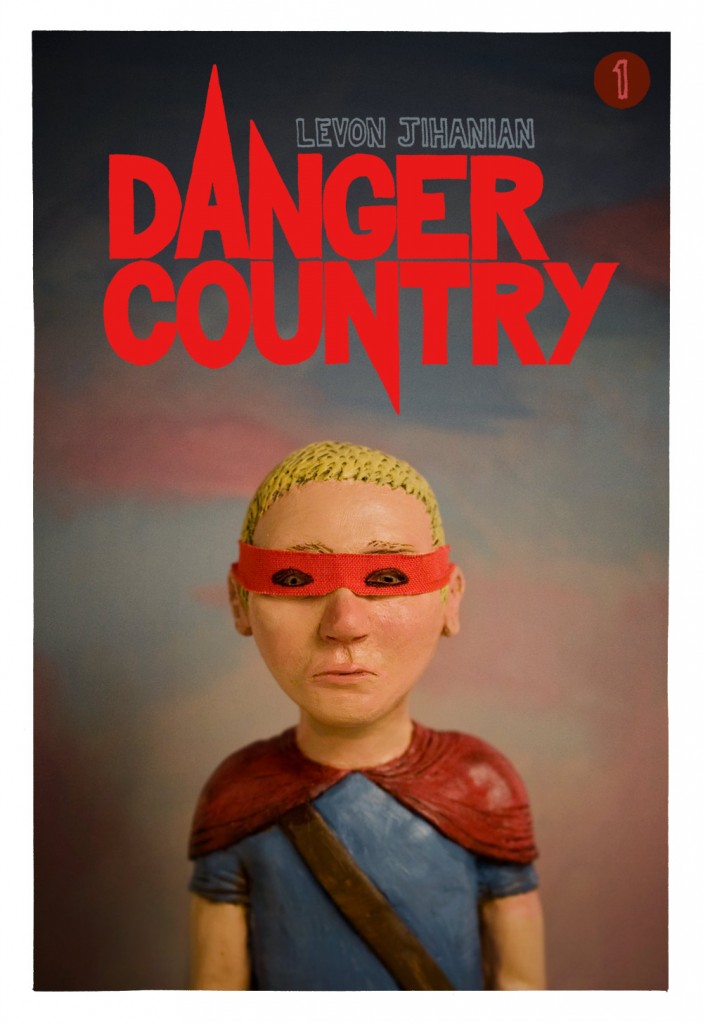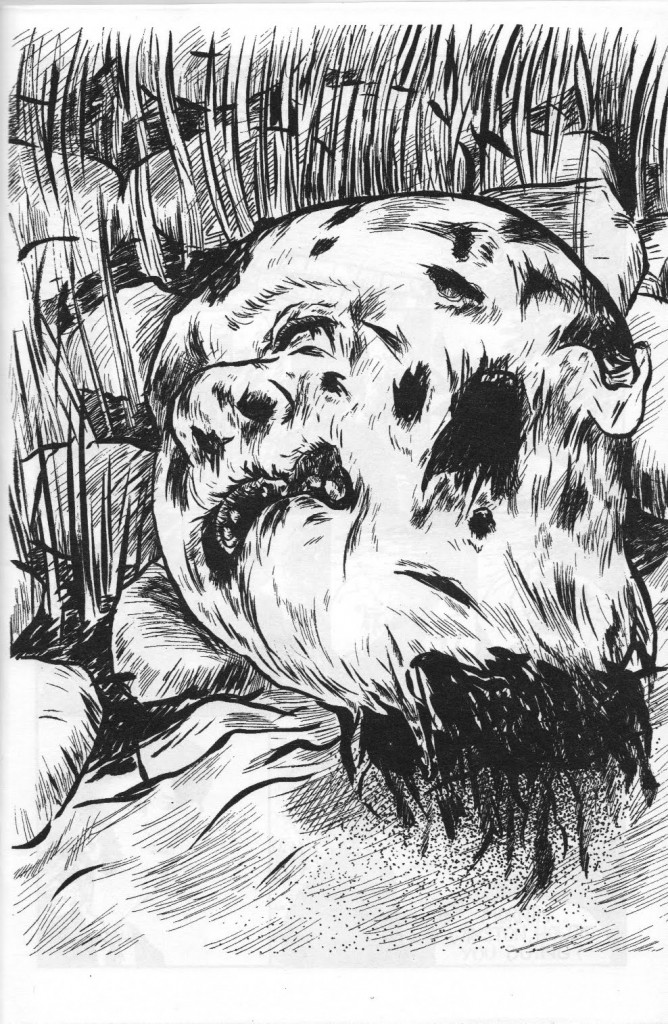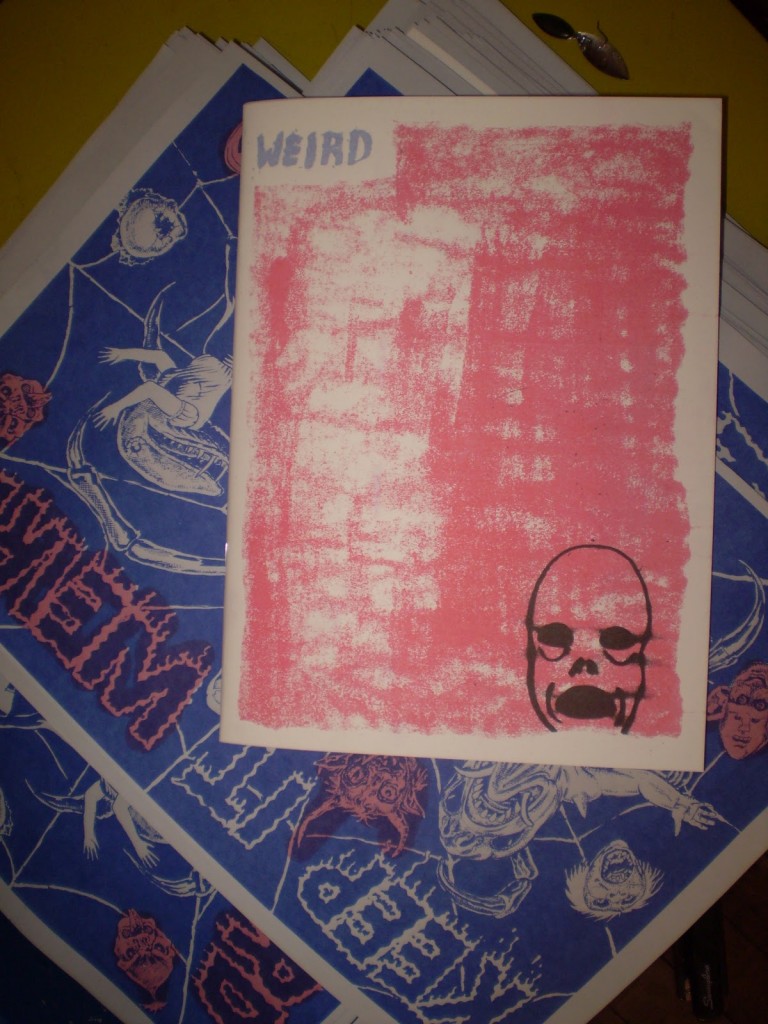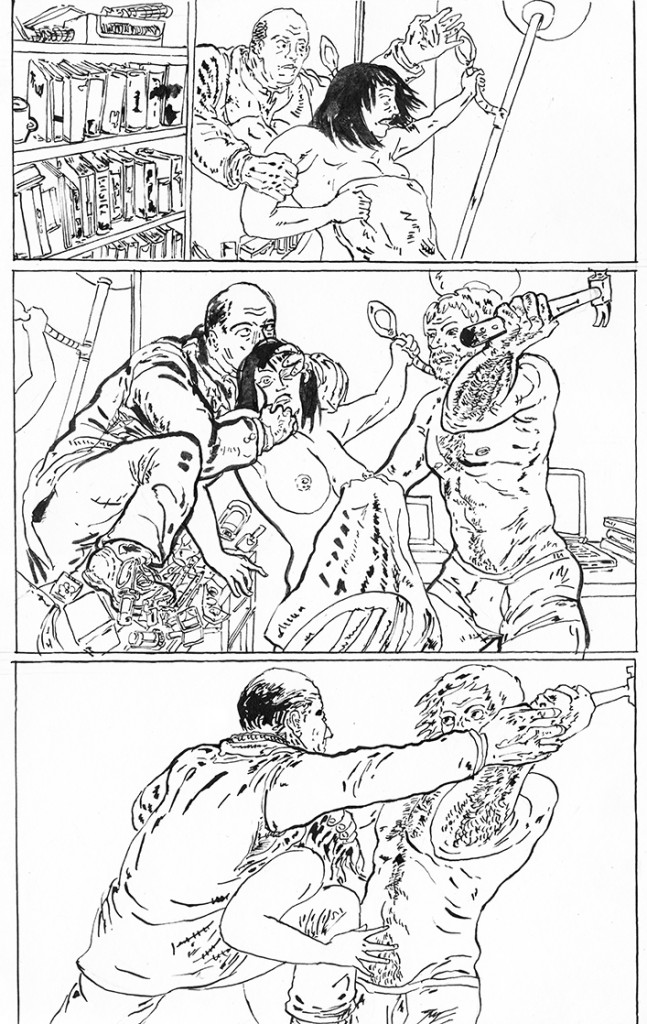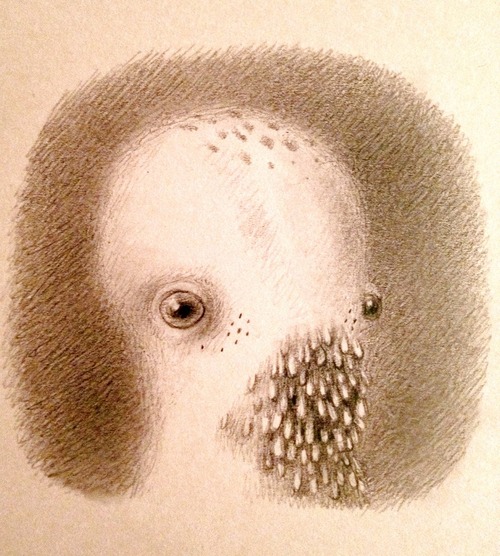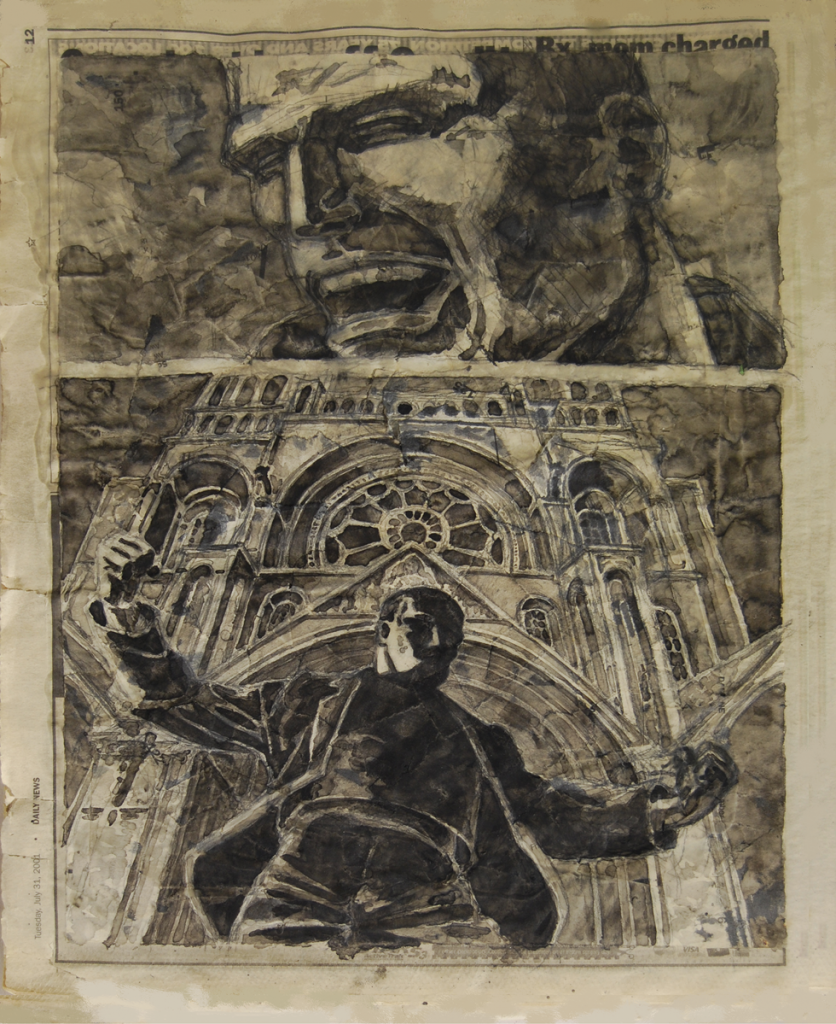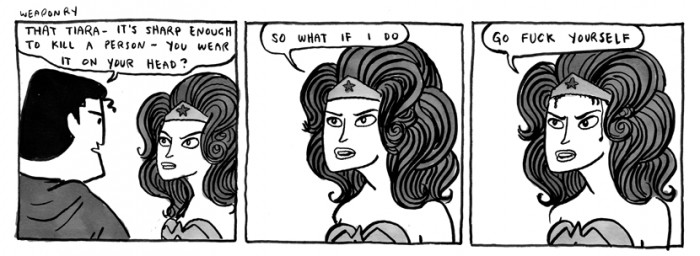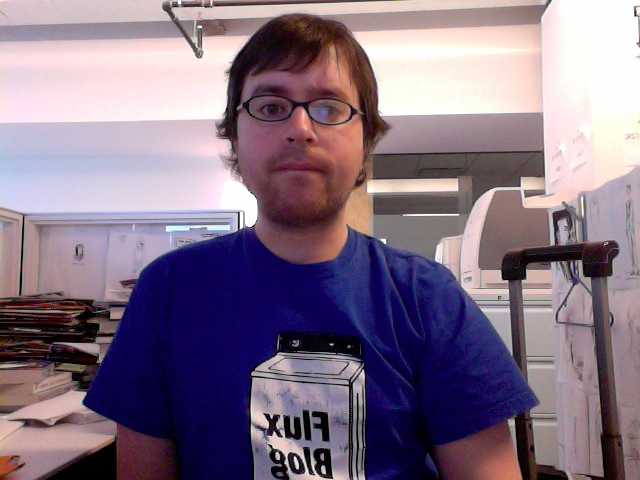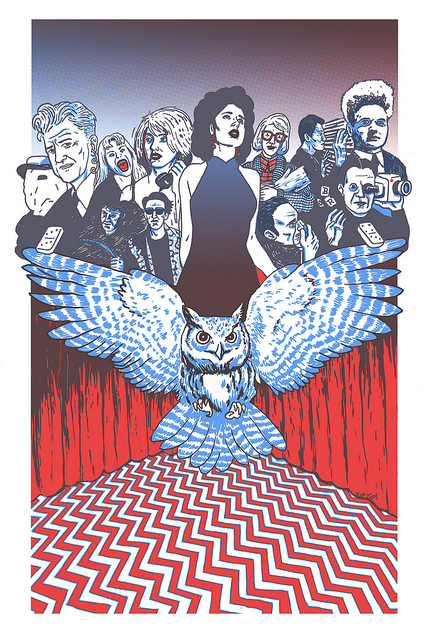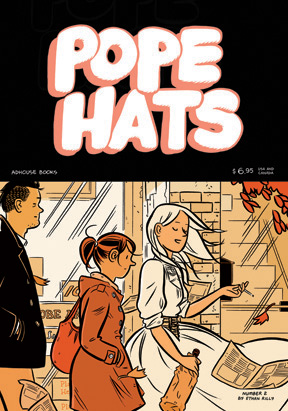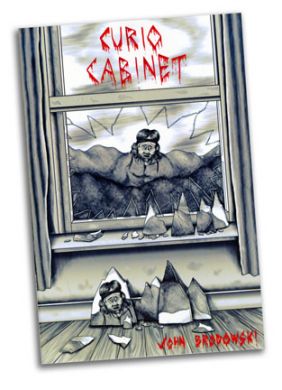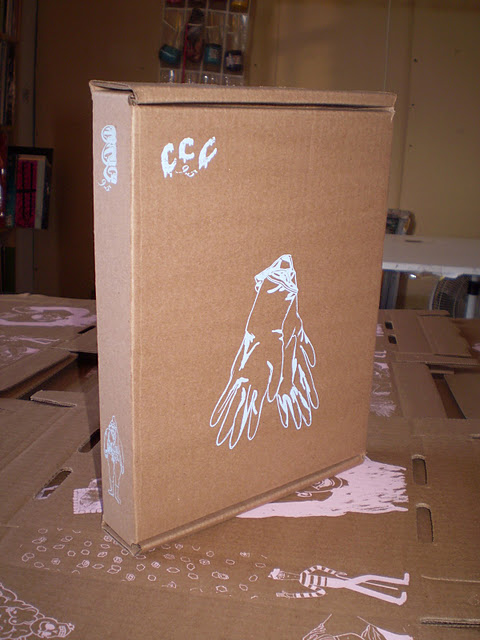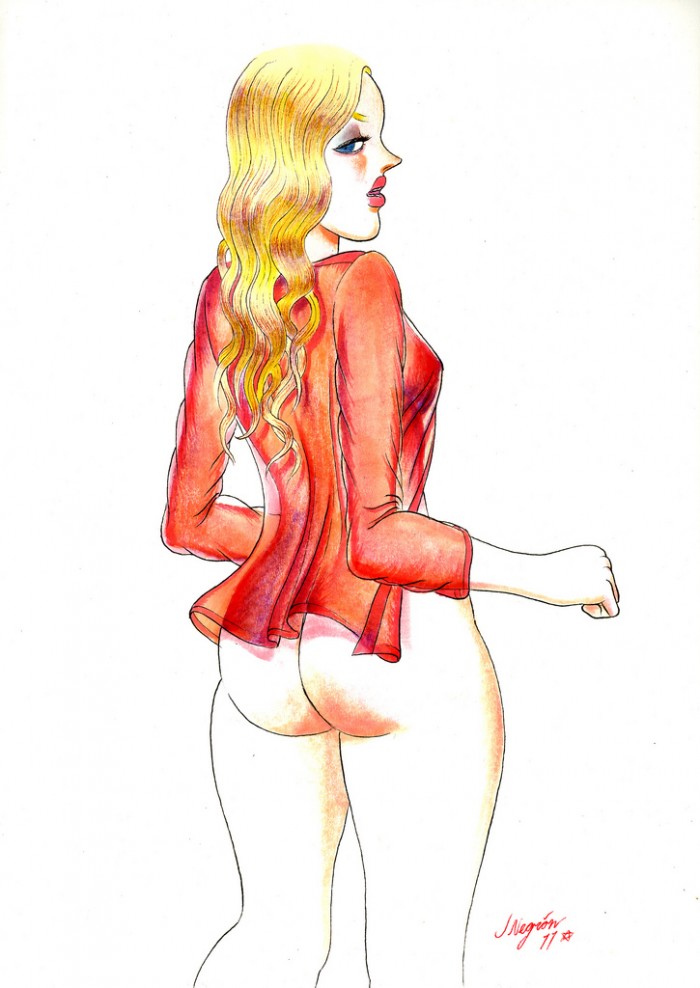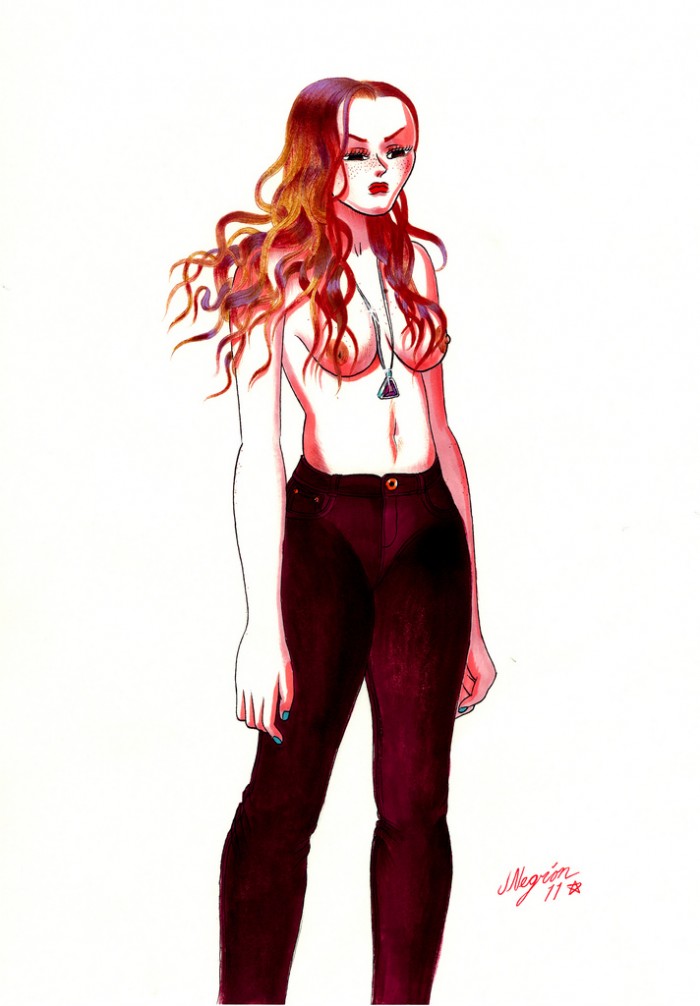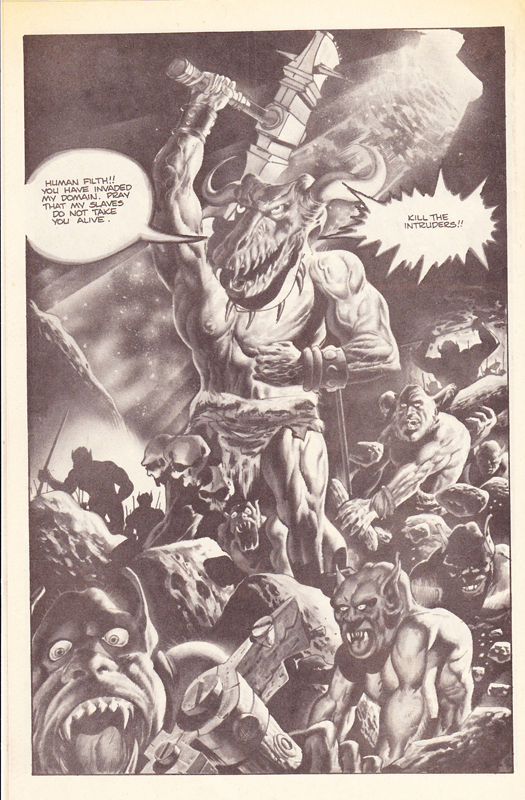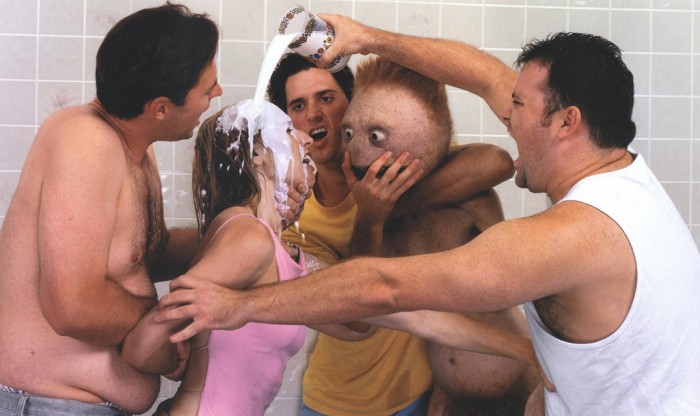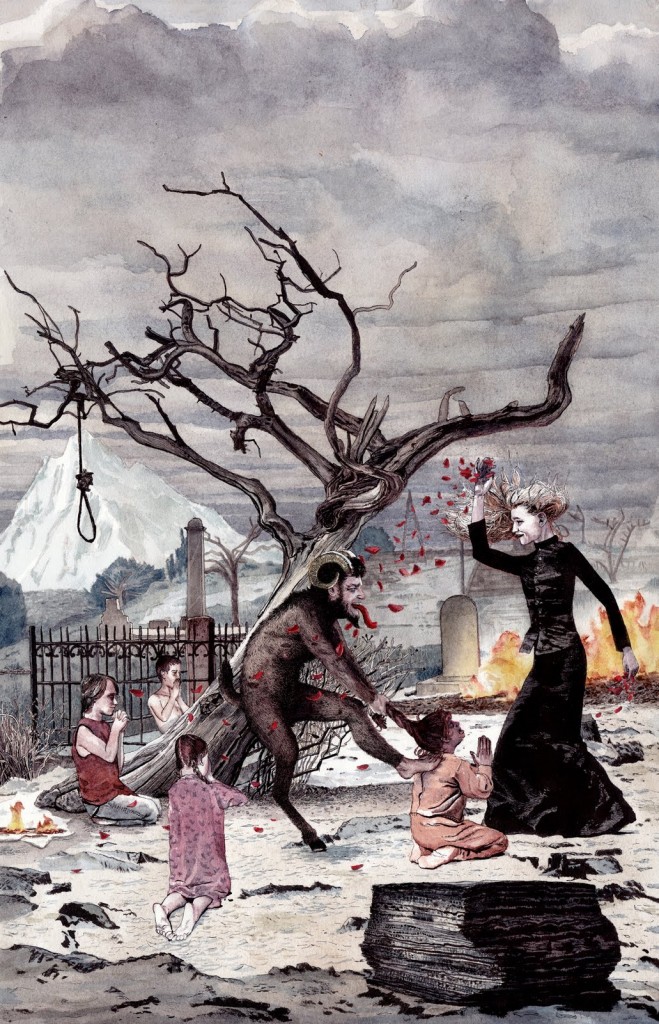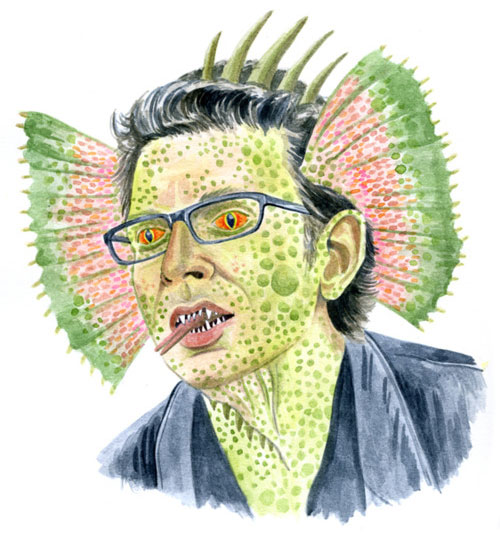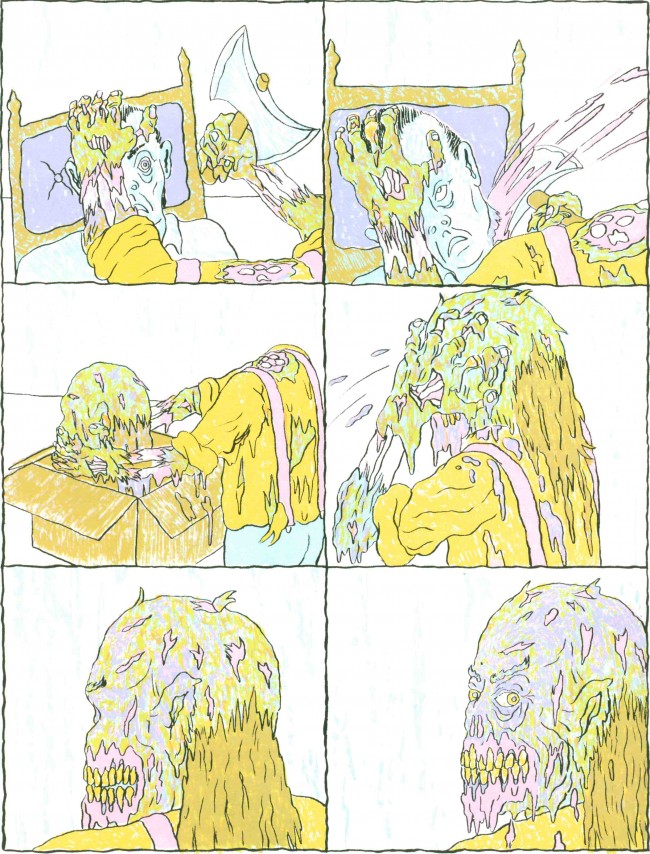Archive for December 9, 2011
Comics Time: The End of the Fucking World Part One
December 9, 2011The End of the Fucking World Part One
Chuck Forsman, writer/artist
self-published, December 2011
12 pages
$1
Buy it from Oily Boutique
How’s that for a title? And I’m pleased to say the contents are just as good. Forsman has become a must-read talent for me; each new minicomic shows growth. He’s a cartoonist of great restraint, in terms of both visuals (this is all slight, feathery lines and quiet, flat-affect “acting” from the characters) and pacing (this is all no-nonsense page-long vignettes, with dialogue and captions strategically deployed for a steady beat-beat-beat rhythm). His characters themselves feel considered and lived-in. The lead character here is a believably blasé creep recounting his childhood, marked by killing animals, mutilating himself, and discovering his inability to feel love or have a sense of humor. But thanks to a terrific hesher character design, his evident sociopathy come across not like some heavy-handed depiction of a budding Ted Bundy but like a satire of run-of-the-mill teenage-dirtbag-ism. He’s like Beavis Bateman.
These two potentially opposing views of our hero come together in the story’s centerpiece, the four pages dedicated to his going-through-the-motions relationship as a 16-year-old with his pretty, forward girlfriend Alyssa. It’s easy to see how his aloofness could come across as attractive, and the resulting, detailed depiction of skewed adolescent sexuality is as skeevy and funny and sexy and creepy as they come. He fantasizes about strangling her as she tells him “God, I want you” takes off her shirt; their tongues intertwine like snakes on a caduceus; he presses his face to the convex arc of her stomach as she presses his head down toward her underwear; they have the following amazing exchange as they snuggle on the couch watching TV:
“Have you ever eaten a pussy before?”
“Sure.”
“I want you to eat mine.”
“Right now?”
The awkwardness, the urgency, the sense of discovery, the sense of revulsion — it’s all true, even if you’ve never stuck your own hand in a garbage disposal on purpose or crushed a stray cat with a stone. Where those aspects of the story will take us is something I’m greatly looking forward to seeing in future issues, given where we’ve gone here.
More Breaking Bad thoughts
December 8, 2011I finished the third episode of Season Two today. SPOILER WARNING
* Three episodes into Breaking Bad Season Two and it already feels almost like a different show. A better show, for sure. Tighter, quieter, more serious.
* A whole lotta factors go into that. For starters, this story arc — call it “Travels with Tuco” — isn’t just technically the payoff for the work done in the seven-episode season one, it’s literally the intended culmination of that work. As I found out from my illustrious commenters after I wrote my post, Season One wasn’t that short by design, but due to the writers’ strike. So if I got to the end feeling a bit uncertain about what the show had said, there was a good reason for it: It hadn’t gotten the chance to finish talking. Here, it did.
* The funny thing about that metaphor, though, is that what it said, it said pretty quietly. Each episode began with a wordless interlude of pure sound and vision: a charred pink stuffed animal and its severed eyeball floating in the Whites’ black-and-white pool as approaching sirens wail; Jesse’s bullet-ridden lowrider mindlessly hopping up and down in the middle of nowhere; a worm’s eye view of Jesse and Walter burying a gun, then trudging through the sun-soaked wilderness. The first two openings warn of impending doom (we still haven’t seen how that first glimpse of the future comes to be); the second is two guys stranded with their thoughts and their consciences, just putting one foot in front of the other in hopes that they’ll get somewhere eventually. It all seems pretty apt.
* Each episode also had a goal-oriented plotline. Walter and Jesse needed to survive their meet-up with Tuco now that they’d seen him kill a man. Walter and Jesse needed to escape Tuco’s clutches now that he’d kidnapped them. Walter and Jesse needed to get home and get clear of the law now that they’d been traced to Tuco and potentially involved in the events leading to his death. This didn’t just keep me focused from moment to moment — it kept them focused, which in turn kept Walter from getting too absent-minded professor and Jesse from getting too juggalo. It was a leavening influence on their behavior that I appreciated, besides being a heck of an incentive for me to keep watching.
* There are many examples of this: The tense moments as they stand around with Tuco while his minion takes care of the body; Jesse and his prostitute friend’s interrogations by Hank and Gomez; Walt’s dealings with his doctors; Jesse’s attempt to get Tuco to snort the poisoned meth. But the best example of this? Tio Salamanca and his tell-tale bell. I’m always happy to see that cadaverous-looking assassin guy from Scarface, and this was a wonderfully awful use for him — a way to coax mounting dread out of Walter and Jesse, and mounting anger and frustration out of their captors, be it Tuco at first or Hank and Gomie later on. And again, it shows how good Breaking Bad is at using film’s aural dimension. (I forgot to mention this during my Boardwalk Empire piece yesterday, but I think a big reason why I was so fond of last week’s episode was that it did things with sound that favorably reminded me of BB.) Edge of your seat stuff, often triggered by just the slightest cues: a look in the old man’s eyes as Tuco wheels him to the dinnertable, a disembodied “ding!” and a knock on the interrogation room door from Hank.
* And hey, let’s talk about Hank, too. When he’s broad, he’s very very broad, even now — the jocular racism, the macabre trophy from his big kill. But in these episodes we saw dimensions of him that may not quite compensate for these lapses in character, but at the very least flesh him out so he’s not just some grinning macho buffoon. As we’d previously seen in the intervention scene last season, it’s clear that Hank really does love and care about Walt, and that’s really endearing. He’s not just trying to find him to placate Marie and Skyler, he obviously really likes the guy and wants him to be okay. Just the force of effort it must have taken him to gain Jesse’s mom’s trust rather than bluster her defenses down is proof of that.
* Moreover, this is a guy who’s actually pretty good at his job, and that brings out some of his best and most interesting qualities. He’s dogged, focused, and intuitive in tracking down Walt — he’s able to turn off his bluster in order to win Jesse’s mom’s trust, which surely took some effort, and he’s able to jerry-rig a way to track Jesse down simply from hearing what kind of car he has. When we see him reviewing the break-in at the chemical plant or attempting to piece together the connection between the burglary, the new pure varieties of meth going around, and the deaths of Crazy Eight and Tuco, you can see he’s thoughtful, curious, attentive to detail, able to see the forest for the trees. Whatever his other shortcomings, and whatever the wisdom or morality of the drug war generally, it’s appealing to see him behave in this intelligent, competent, likeable manner. (He’s friendliest with Gomie during these interludes, too. And hey, you figure Gomie puts up with him for some reason despite all his piggishness, which also helps humanize the guy.)
* Ultimately, my main takeaway from this opening arc is that I might have had the wrong idea of what the show is even about. Going in, I really knew only the bare bones, a la “mob boss goes to therapy” or “plane crashes on a mysterious island”: “dying science teacher sells crystal meth to make money.” I assumed that meant that after seeing his initial decision to do this, we’d spend some time with the “new normal”: He’d make meth and sell it and keep it all a secret from his family and friends, and this would be the status quo until the end of the season or so, when something would happen. That’s how these things typically work: the cops and dealers on The Wire, Tony and friends on The Sopranos, the men and women of Sterling Cooper on Mad Men — not to mention the mobsters in GoodFellas and Casino, from whence all these shows can be traced via Scorses’s influence on David Chase — did basically their normal thing for a while, until something sends them off the tracks. But Walter never got on them! From the moment he decides to cook meth, he’s simply careened from one catastrophe to the next. He kills a guy in the first episode! And it’s been a series of cascading disasters ever since. That’s a very, very different way to approach this subject than what I expected — and I feel like in these last few episodes, the enormity of Walter’s situation is stripping down the show’s occasional goofiness quite a bit. When stripping naked in a grocery store and being taken to the hospital for neurological and psychiatric evaluations is your protagonist’s best-case scenario, you really don’t have time to monkey around. The seriousness of purpose really suits the show. I hope it keeps it up.
Comics Time: Danger Country #1
December 8, 2011Danger Country #1
Levon Jihanian, writer/artist
Teenage Dinosaur, 2011
40 pages
$5
Buy it from Levon Jihanian
For today’s Comics Time review, please visit The Comics Journal.
Boardwalk Empire thoughts
December 7, 2011SPOILER WARNING, SPOILER WARNING
* Though I’ve been watching Boardwalk Empire faithfully since the series premiere, I’ve only written about it a handful of times. I think that’s because my enjoyment of it is a pretty simple thing. It’s a sumptuously shot, dressed, and acted gangster period piece, featuring increasingly savage and memorable outbursts of violence, and starring real-world organized-crime pioneers like Lucky Luciano, Meyer Lansky, and Al Capone as “playable characters.” In that light my fondness for the show doesn’t require a great deal of explanation. Moreover, the growing pains of a young show striving for greatness, an occasional shaky hand with character development, and (particularly this season) some visible discomfort with its women characters (usually where the rubber meets the road for the really great TV dramas) would seem to defy attempts to delve any deeper.
* Until now. My my my, but that was a magnificent episode the other night. I was actually a bit scared to search for reviews afterwards, since I knew without looking that any episode that took things as far as this one did would be a make or break one for many viewers and reviewers. Put me in the “make” column for sure.
* It was the dreamlike power of the episode that did it for me. By “dreamlike” I don’t mean amorphous, illogical, or surreal, at least not in this case. I mean the heightened reality of dreams, in which words and objects are freighted with meaning through their proximity to the strangeness or momentousness of the events of the dream. It’s gonna take me a bit to explain this, so please bear with me.
* It reminds me of the tail end of Grant Morrison’s big Batman R.I.P./Batman and Robin/The Return of Bruce Wayne storyline, in which the presence of certain artifacts in Bruce’s life — his mother’s pearls, her murderer’s gun, the bell he used to summon Alfred to save his life on the night he decided to become Batman — cast shadows through time, affecting him again and again.
* It also reminds me of an astonishing episode of Little House on the Prairie I happened to get stuck watching while feeding my baby with the remote control out of reach months ago. I found out later that it was the two-parter that served as the finale for Michael Landon’s final season with the ongoing series. Landon’s character’s adopted son gets caught in the crossfire of a bank robbery and is rendered catatonic. Desperate for help, Pa Ingalls rides off with the son to seek a doctor, and the show becomes this series of sweeping vistas as he goes deeper and deeper into the wilderness, until finally the horse dies (I think) and they’re trapped where they’ve stopped, and so thinking they’ll die he builds an altar of stones to pray for divine intervention, and in the middle of a thunderstorm an old man appears to them to help them…It was all image, all emotion. It led with raw power and let the plot draft on its slipstream.
* In this episode’s case, that meant a few things. First there was the repetition of lines, fraught with meaning: “Jimmy, I have to go.” “I’ll remember! I’ll remember!” “There’s nothing wrong, baby. There’s nothing wrong with any of it!” “Then finish it, goddamn you. Finish it!” (Eyes Wide Shut used this same technique.) Other lines were repeated as actions: the bayonet Jimmy told the army recruiter he wanted to shove into the Kaiser’s guts became the knife he used to stab the Commodore in the stomach. Actions were repeated and inverted as well: Jimmy beats his professor for assaulting his mother, then attacks his mother years later. Music cues stretched across scenes, plotlines, and timeframes. Fades to black brought us in and out of flashbacks and simply from moment to moment. Textbook Freudian uncanny doubling. It’s as if all these things operated on a slightly higher level of existence than everyday reality, less fixed in time, playing themselves out on a different scale.
* People seemed more…vivid as well. I don’t want to say mythic, because these days that’s a loaded term indicative of self-conscious Joseph Campbellization. (I know, I know, the show went full-on Oedipus here, so they brought it on themselves, but this felt more raw and real than “modern myths” nonsense. The Commodore didn’t just attack Jimmy with anything, he stabbed him in the back with some kind of spear. And he emerged from nowhere, a towering furious mute Bad Father. Jimmy’s guardian Richard Harrow had similar trouble speaking in this episode — he was a dark angel quietly disposing of the slain father and drawing the curtains on Jimmy’s consciousness with a nod. Van Alden tells us of his life as a living indictment of his parents’ most deeply held beliefs, and ends the episode by fleeing like, I don’t know, Frankenstein’s monster, rejected by his creator. The vulpine priest continued to hover over Margaret, benevolently preying on her guilt in his collar and cassock. Even Jimmy’s increasingly pronounced limp (to my eyes at least), and the way he cloaked the wounded half of his body from his sleepy son with his black jacket like a human yin-yang or the Phantom of the Opera, lent him a monstrous quality as he went about his monstrous work in this episode.
* Objects took on a numinous quality too. Agent Sebso’s gun and shoes are presented as an indictment of Agent Van Alden in and of themselves, dredged up from the river and the past. Margaret’s daughter’s leg braces embody her painful future, and provide the support needed for Margaret and Owen to have the conversation that they’ll both instantly regret. Margaret views the subpoena she receives as literally a divine calling to account. Angela’s white dress and Gillian’s torn dress are loaded with messages for Jimmy. The nearby railroad track, the clanging of its gate bells, gave the passing of time itself new urgency — each moment received its own soundtrack.
* So yeah, just a ton of powerful images and sounds, all of which feel like half-understood things to me, their impact primarily emotional. If you can construct a story out of that stuff, you’ve achieved something pretty special.
* And the episode pretty much could have coasted on the Jimmy/Angela/Gillian material, but in addition, it was Nucky Comes Alive. I’ve read writers I respect (Matt Zoller Seitz, I believe) argue that in retrospect, Steve Buscemi, as enjoyable as he is in the role, was ultimately miscast. But if I had to pinpoint one reason why I disagree, it would have to be scenes like the one in which he more or less threatens to have Margaret, the woman he loves (and I don’t doubt that he loves her!), murdered if she decides to testify about his role in the death of her abusive late husband. It reminded me of an earlier Nucky highlight from this season: His slowly revealed rage at Eli as he pulls the rug out from his own “apology accepted” and browbeats his penitent brother out of any hope of rapprochement with his “get on your knees” speech. The fury in Nucky’s eyes in both these moments! Buscemi spends most of his time as Nucky in more or less harmless emotional modes: gladhanding politician, avuncular friend/father figure/husband figure, “heavy hangs the head that wears the crown” man at the top. But when you really press him, when you do something that strikes at his core — and I don’t even mean run-of-the-mill confrontations with adversaries; this is basically limited to betrayals by family — suddenly the teeth get bared in such convincing fashion that it looks like he could tear someone’s fucking face off. And I have to imagine that this is what the other characters pick up on in a world with Buscemi/Nucky calling the shots. It took a lot to stand out in an episode this epic if you weren’t part of the Oedipal drama at its center; Buscemi and Nucky had what it took.
* The episode also tied in with any number of plot threads I’d enjoyed, and even more interestingly that I hadn’t enjoyed, from the season so far. Take the status of the black workers, for example. During Nucky’s conversation with his sharp new lawyer Fallon, I marveled at how candid they felt comfortable being despite the presence of a third person in the room, Nucky’s butler Harlan. The black servant class is invisible to these guys until they’re needed for something, I thought. But then Harland pipes up at Fallon’s request…and suddenly he’s made himself an indispensable man in two of the longest-running plotlines on the show, Nucky’s corruption charges and Van Alden’s incipient psychosis. It’s like finding out that the last piece of the puzzle was in your hand all along.
* It was nice for Angela to get a last turn in the sun. Her murder by Manny Horvitz last week was appropriately awful — I was hit pretty hard when she begged for mercy on the grounds that she has a little boy — but at the same time she’d been so underutilized all season long that it felt less like the end of her story and more like a page from Jimmy’s. “Women in refrigerators,” in other words. I couldn’t help but feel that in eliminating a character that the show appeared to have little use for anymore, Horvitz was serving as a proxy for the writers. But Jimmy’s flashback also served as an origin story for a character who really needed one. How did a relatively free-thinking lesbian end up with a dude like Jimmy, even given societal pressures of the day? Well, she was a college-age kid discovering her sexuality as she went along, and anyone who’s been that age can tell you how many roads that can take you down before you find the right one, including roads that cut you off from where you really ought to go. In her case she was trapped like a fly in amber by her pregnancy, knocked up and affianced to a guy she likes a lot but probably didn’t and could never really love, pressured against ending either the relationship or the pregnancy by societal stricture, probably guilt about betraying a man at war, possibly fear of what he’d do when he got home given what she witnessed the night before he enlisted. It’s weirdly gutsy of the show to give us its best Angela episode of the season after the one in which it killed her.
* I’m also glad to see Van Alden reemerge. I have nothing against having a baby as a plotline for a fully grown-up character in a drama — it’s not like when you’re a few seasons into a comedy or soap about young people, the writers run out of ideas, and suddenly a character or two gets saddled with a bun in the oven that necessarily closes them off from all sorts of romantic and comedic possibilities. (Cf. this season of Gossip Girl, if you dare.) But the execution of Van Alden’s baby storyline has been every bit as limiting and stultifying as the worst such sitcom. He’s just been completely closed off from the action, existing almost on a show within a show. Gone was the Wrath of God figure from Season One, the guy who made me more nervous every time he was on screen than anyone else. Even to the extent that he threatened Nucky, it was at a remove, as a potential witness Nucky heard about third- or fourth-hand. (Of course, it could be worse — he could be Lucy Danziger, whom the baby storyline granted several mightily creepy-sexy nude scenes and then chased off the show entirely.) But now…but now! What the hell is he gonna do now? He’s a freaking fugitive murder suspect! He foreswore his oath, to be all Game of Thrones about it. A suicide run against Nucky as the architect of his downfall, a Travis Bickle attempt to “rescue” Margaret from inequity — who knows what comes next? That’s some delicious uncertainty is what that is.
* Circling back to the doubling I discussed earlier, although this time in far less uncanny fashion: Two of my favorite developments this season provide a direct compare-and-contrast in terms of styles of criminal leadership — and no, it doesn’t involve Nucky and Jimmy, but Chalky and Eli. I’m gonna spell his name wrong I just know it, but Dunn Purnsley, the charismatic chatterbox (played with silver-tongued malevolence by Erik LaRay Harvey) who threatened Chalky in jail without realizing who he was and then paid the price for it with a beatdown from Chalky’s grateful subjects, is subsequently recruited by Chalky as a valued henchman and the pointman for the strike. Which is great in and of itself because Purnsley’s a wonderfully entertaining character I’m happy to see stick around, like Richard Harrow last year, but also because of the way it demonstrates Chalky’s thoughtful and magnanimous approach to power. By contrast, poor Deputy Halloran is repaid by years of loyal, silent service to Eli with a beatdown of his own, followed by a genuinely menacing but ultimately idiotically transparent attempt at intimidation by Eli himself — all over a treason Halloran was undoubtedly far too stupid to even contemplate, much less commit. And all Eli’s thuggery earned him was precisely the betrayal it was designed to prevent. If you want an illustration of why Chalky’s at the top of his world while Eli’s a perpetual also-ran, look no further.
* I’d also like to sing the praises of Mickey Doyle, believe it or not. One of the weirdest performances on a show full of weird performances, Paul Sparks’s unctuous, nasal, giggling bootlegger has become a favorite occupier of screen time for me, for no more complicated a reason than that he’s funny and strange, moving and sounding like no other person on television. Take it where you can get it!
* Women-wise? This was a step in the right direction. Angela we’ve already talked about, but however predatory and loathsome she may be, it’s abundantly clear that Gillian was broken by the Commodore all those years ago. Her seduction of Jimmy was train-wreck awful but also pitiful — the way she had to repeat to herself that there was nothing wrong with “any of it” could only be referring to the whole freakshow of her life, whether or not she’d ever admit it. Ironically given the circumstnaces, it took some of the archetypal Jocasta out of her and made her into a human being we could understand.
* And while there’s virtually nothing I find more boring in a drama than Catholicism, I can almost appreciate its use in Margaret’s storyline. I think we’ve learned enough about her to understand that this isn’t a real religious awakening in her — it’s a lighthouse as she drifts in the fog of her own guilt over everything else in her life. As she convinces herself that this is the only outlet for her emotions and the only way to right the wrongs she’s committed, she could become as problematic as any legit fanatic.
* So there you have it: An episode that might could represent the moment Boardwalk Empire became Boardwalk Empire — an a-ha episode akin to “College” for The Sopranos, according to conventional wisdom, or “University” for The Sopranos, according to me. And it sets up quite a finale: As best I can tell, Chalky is still gunning for the KKK, Manny Horvitz is after Jimmy, Jimmy has got to be after Manny, Richard seems even more likely after Manny, Mickey Doyle could be up to no good, Van Alden could be up to god knows what, Nucky and Owen might come to blows…
Carnival of souls: Special “post-Shamus/post-BCGF” edition
December 6, 2011* So yeah, Gareb Shamus has resigned from Wizard. By their works ye shall know them.
* Tom Spurgeon’s BCGF con report is the most thorough you’re likely to find. His assessment of the show itself centers on the caveat that (like all shows) it’s not a show for everyone. I’m really curious as to how deeply that analysis takes root, because most everyone I spoke to at the show was almost deliriously happy with it (myself included — yes, I talk to myself), but it’s easy to see how the narcissism of small differences among comics people could lead someone whose conception of “good comics” doesn’t quite overlap with BCGF’s, or has almost nothing in common with it at all, could really hate that show from afar or even up close. But I think this is the extent of my desire to discuss the show through this lens, because I don’t think I really discuss anything by saying “some people who aren’t me might not like this that much.” And BCGF is an amazing fucking show. Just ask ADDXSTC fave Geoff Grogan, who I can’t remember ever penning this effusive a con report before — doubly surprising given that in the past he’s been at loggerheads with the Kramers Ergot aesthetic that is the show’s backbone.
* Among the many, many, many, many, many books Closed Caption Comics debuted at the show were Conor Stechschulte’s The Amateurs and the Noel Freibert-edited anthology Weird.
* Emily Carroll got herself a big NYC publisher book deal. Well deserved.
* Geof Darrow’s lost Superman cover will show up in print after all. Hooray!
* Isaac Moylan presents “The Mirror.”
* I feel like I’ve written these exact words before, but Jesus Christ, Renee French.
* Uno Moralez continues to tap directly into my underbrain.

* Apparently I never properly subscribed to the RSS feed on Geoff Grogan’s new site, because otherwise I’d be linking to pages from his terrific book Look Out!! Monsters all the time.
* Kate Beaton’s Wonder Woman comics are terrific.
* Finally, now that I’m embarking on Breaking Bad, I want to go back to a couple other shows I wrote about this fall and highlight a pair of reader comments I got a lot out of: Alan on Mad Men Season Four and Hob on Boardwalk Empire Season Two. Spoilers ahoy, obviously, but Alan’s thoughts on a certain MM-late-S4 character contrast that hit home with him on a personal level opened my eyes to a whole new way of seeing the show’s central family dynamic, and what Hob said about the link between nihilism and sentimentality smacked me right between the eyes. Thank you, gentlemen, and thank you to everyone who comments on my TV posts — pretty much no matter what show I’ve written about, you’ve been a consistent, collective delight and reward.
The video for Scott Weiland’s “Winter Wonderland” is so deeply wonderful I hardly know what to do with myself
December 5, 2011If a twenty-year journey through heroin addiction leads here, it’s got to be almost worth it.
Breaking Bad thoughts
December 5, 2011I watched all of Season One. SPOILER WARNING
* Breaking Bad started off a lot broader than I expected. And I’ll be honest, it was hard not to hold that against the show, no matter how many times I reminded myself that The Sopranos spent two seasons as a black comedy about men trying to kill each other over cunnilingus and things like that.
* Mind you, the core family was fine the whole time. Bryan Cranston exudes the air of an actor who knows he has the role of a lifetime every moment he’s on screen. R.J. Mitte portrays Walt Jr.’s disability exactly the way he should, like an otherwise normal teenage kid dealing with one extra layer of crappiness. And though Anna Gunn’s Skyler is written a wee bit too pointedly oblivious to what’s really going on with Walter now and then, she’s certainly believable as a basically happy person suddenly being made to struggle with issues that threaten that happiness, financial and physical alike.
* But everyone else? The bulldog back-slapping brother-in-law, with his off-color remarks and gung-ho DEA attitude? The unbearable sister, meddling and judgmental and prone to referring to people as being “on marijuana”? Jesse Pinkman, a Slim Shady caricature who says “what up, biatch?” on his outgoing answering machine message? Various ésé-spouting Mexican-American gangsters blaring generic hip hop out of their cars and stereo systems? Nuance is hard to come by here.
* Then I started struggling with Walter’s actions, too. There was something too pat about the way he approached, say, disposing of a body like grading a quiz at work. I know that that’s what movies tell us that mild-mannered people suddenly drawn into life-or-death criminal enterprises would do, but a nervous breakdown seems like a far more likely result. The fact that that storyline devolved into splatstick with the bathtub full of dissolved body parts crashing through the floor didn’t help matters.
* I did buy the way he went about figuring out to do with the imprisoned Crazy Eight — basically coming right out and saying that he was bonding with him in an attempt to prevent himself from being able to kill the guy. And I bought the little touches in that storyline, too, from giving him hand sanitizer to use after he relieves himself in the bucket, to the way he wished aloud that Crazy Eight hadn’t hidden a shard of the broken plate to use as a weapon when he first discovered that it was missing. But after the deed was done, it seemed to weigh no more heavily on his mind than the secret of his cancer diagnosis, or whether or not to go back into cooking meth, or whether to accept money from his old lab partner, or whether or not to forgive Skyler for tipping the guy off about the situation in the first place, or whether or not to get treatment…I just had a really hard time swallowing that killing two people, including one time by hand, wouldn’t totally eat him alive.
* But a couple of moments toward the end of this short first season sold me on it enough to keep going. Well, that’s not quite fair — I’d probably have kept going regardless, it’s a perfectly entertaining show. But these moments made me think that maybe it could go from perfectly entertaining to hanging with the big boys.
* The first was the intervention scene, when Walter’s family tries to convince him to get treatment for his cancer. In particular, you could feel the actors playing the in-laws reacting to this material, much better than what they’d been given so far, like drowning animals getting their first big gasp of saving air. The sister was suddenly allowed to show both genuine compassion and express a viewpoint that didn’t conform precisely to our received wisdom about What Assholes Think and Do. Skyler’s benevolence, her facade of creating this safe space where everyone could speak their minds freely, was complicated refreshingly by her simple desperation to keep her husband alive. (Understandable! But not saintly, and that’s the point.) Walter was finally given the chance to truly hash out and articulate how crushingly unfair he felt the cancer to be in a life already proscribed and fenced in by things he never quite felt within his control. Even the buffoonish cop brother had a chance to visibly struggle with his own inability to express complicated, serious ideas in a fashion commensurate with their complexity and seriousness; by the end of the scene, he was quietly crying, though neither the filmmakers nor the actor made a big deal out of it, to their great credit. It was a beautifully done scene, one that convinced me that these were people who contained more than was visible on their surfaces, and/or that the filmmakers were up to the task of showing that to be the case. (There was a parallel track in that episode that, while not quite up to the intervention’s standards, helped flesh Jesse out in a similar fashion: His ability to convincingly clean up for a job interview, his crushed hopes when he realized what he’d be relegated to doing if he were to get the job, his lack of comfort with falling right back into his old ways given what he’d been through, his disappointment in himself for not being able to live up to the standard he and Mister White had set.)
* The second came a couple of episodes later, after Tuco beat Jesse up and stole his meth and money, when Walter goes to Tuco’s place to steal it back. When he gets back to his car after blowing up the room and working out the deal with the stunned but impressed Tuco, he lets out a primal growl of exhilaration, pumping his fists and pounding on the steering wheel. And suddenly I could understand why the murders didn’t destroy him like I thought they would — like I thought they ought to, frankly; suddenly his fun but kind of cheap outbursts of vigilante justice — roughing up the bullies in the clothing store when they made fun of Walt Junior, blowing up the loudmouth Bluetooth guy’s sportscar at the gas station — seemed less like “hey, wouldn’t it be funny if we ended the episode like this?” and more like signposts on a road to a destination. The destination being “Walter White is actually dangerous inside.” For whatever reason, some innate tendency toward risk-taking, thrillseeking, intimidation, and violence that had never had a chance to express itself until now was out, and the mild-mannered science teacher was now a bald-headed suicide bomber growling out his triumph with a lap full of hundred dollar bills. When they called the show Breaking Bad, they didn’t just mean going bad in terms of breaking the law — they meant that some rough beast was slouching toward Albuquerque to be born.
* And that’s the fundamental difference between Breaking Bad and all of the other shows I’ve watched that I’d consider to be the Great TV Dramas. The Sopranos, Deadwood, The Wire, Mad Men, Battlestar Galactica, Twin Peaks, even the less self-consciously Great Lost or the flawed Boardwalk Empire or the very young Game of Thrones were basically stories about men and women dealing with the consequences of moral codes they’d formed long ago and adhered to for years. Even in cases where circumstances recently changed for them in such a way as to force them to confront those consequences much more urgently or directly — a new sheriff in town, a new Hand of the King, a plane crash on a mysterious island, interplanetary robot genocide — the value systems we saw them working with were already in place before the cameras started rolling. On Breaking Bad, however, Walter White is becoming a changed man before our eyes. At times it’s just as baffling to us as it is to poor Jesse. In the end, I suppose it’s no surprise that I finally cottoned to the show when I felt like I’d gotten the lay of the land for what he’d changed into, and how he’d behave from now on. Suddenly the show had become the kind of show I’m familiar with as being prone to greatness.
* The show really lucked out in this respect: What a fucking transformation from Bryan Cranston simply by shaving his head! From “Dad who enjoys his daughter’s soccer games” to “police still have yet to identify several of the bodies found in the crawlspace” with the glide of a hair clipper. Years of closely reading comic books and learning to take every aesthetic quality as an intentional vector of story or tonal information has left me really fascinated by the impact a character’s mere physical appearance can have on the story he’s in, and this is as good an example of that as Jon Hamm’s prodigious handsomeness making Don Draper bearable.
* It also paid more attention to the aural dimension of filmmaking than probably any of the shows I listed above save, I dunno, Twin Peaks? The drones and buzzes in Walter’s head when things are going really badly for him are a totally effective tool in their arsenal. I don’t know why more shows wouldn’t go for that kind of thing.
* And let’s be honest, I’m predisposed to appreciate any show that uses its lead character’s relative willingness and ability to slip it to Anna Gunn as a barometer for his state of mind. (Although is it really a barometer of anything but whether or not he is a living heterosexual male with a functioning penis?)
* Anyway, I thought the very last episode was a bit anticlimactic. I like that Walt’s thinking big with the meth operation, and again, I’m deeply okay with rogering Anna Gunn. But the main takeaways from this episode — that Walt can go toe to toe with a druglord and that said druglord is an enormously unpredictable and violent meth-addled lunatic — were already established with much higher stakes in the previous episode — instead of hosting tense junkyard meetings, Walt blew up Tuco’s office; instead of proving Tuco’s propensity for violence by beating up some unnamed underling, the show proved it by beating up Jesse. But even still, I’m excited to see if my armchair psychoanalysis of Walter holds water in the following seasons. What up, biatch.
Gareb Shamus out at Wizard
December 3, 2011Carnival of souls: Special “pre-BCGF” edition
December 2, 2011* Every year as the Brooklyn Comics and Graphics Festival approaches, I start to see my wallet as an object of intermingled pity, dread, and revulsion, like the Eraserhead baby. I’m racking my brain to see if this is an exaggeration, but nope, I don’t think it is: There’s something interesting at literally every table. Can you say that about any other show? Anyway, I’ll obviously be there, so please say hello to me if you see me. I look like this:
The lack of lens glare over my left eye can be attributed to me breaking my glasses last night on the platform of the Jamaica Long Island Rail Road station while overenthusiastically acting out a scene I enjoyed from season one of Breaking Bad.
* Continuing from last Carnival, here are several guides to noteworthy books you’ll be able to buy there. If you read only one, make it Chris Mautner from Robot 6’s comprehensive round-up post. But beyond that, there’s info galore from…
* Zack Soto, who’s repping the new publishing collective Press Gang, his own Study Group Magazine, and about a million lovely prints;
* non-attendee Dustin Harbin, who notes among other things the opportunity to pick up this year’s alt-festival circuit sleeper hit, Ethan Rilly’s Pope Hats #2 from AdHouse;
* Barry Matthews and Leon Avelino at Secret Acres, who in addition to bringing nearly every single person they publish will have a new issue of John Brodowski’s excellent alt-genre series Curio Cabinet on hand;
* Ryan Sands, who’s bringing tons of work from the greater Same Hat!/Electric Ant/Thickness/Chameleon hivemind;
* Closed Caption Comics, who are literally just filling little cardboard boxes with comics they recently made and calling that issue #9.5 of their flagship anthology;
* Benjamin Marra, who’s bringing the whole panoply of Traditional Comics releases, including the brand new Night Business #4;
* Tom Kaczynski, who lists the goods to be gotten from his Uncivilized Books imprint;
* and Unciv artist Gabrielle Bell, who posts the latest in her ridiculously strong year of autobio strips.
* Few things on the comics internet excite me more than a new Tom Spurgeon review of a book I’ve read; each one reminds me that nobody does it better. Here he is on Johnny Ryan’s Prison Pit Book Three. And though I haven’t read the comic yet, here he is on Joe Sacco’s new minicomic from Fantagraphics, The Road to Wigan Pier, a review of George Orwell’s book of the same name.
* Here’s another massive TCJ.com interview I’m saving for when I can really savor it: Dan Nadel speaks with the singular talent Marc Bell.
* Meanwhile, Robin McConnell interviews Geof Darrow, who was practically Cartoonist of the Year this year despite not publishing anything simply by virtue of his influence. Over on Robot 6 I noted Darrow’s recent rejected Superman cover, which he talks about (and posts!) in the interview.
* Game of Thrones hits DVD and Blu-Ray on March 6.
* Dark Horse is the latest publisher to go same-day digital, as of a mere two weeks from now. Après DC la déluge.
* Adrian Tomine just says no to making graphic novels instead of short stories. I’m pretty okay with this.
* Will Jonny Negron’s winning streak never end?
* There’s not a great deal to dislike about Power Comics, a new tumblr dedicated, essentially, to the ’80s black-and-white-boom books Benjamin Marra is pastiching in Night Business. (Hat tip: Agent M.)
* Aeron Alfrey reminds us that it’s never a bad time to revisit Charlie White’s Understanding Joshua.
* First U2, now Bryan Ferry: Trent Reznor’s year in cover versions has been a fun one.
* Any time my friend and collaborator Matt Rota posts new art, it’s worth checking out.
* Like most people on the Internet, I enjoy artist Brandon Bird’s unique entertainment-industry surrealism, both in his own paintings and the shows he curates. His latest is dedicated to the humans of Jurassic Park. I find myself hoping that someone chose to immortalize this one low-angle shot I remember quite vividly of Laura Dern’s khaki-clad hind end as she prepares to sprint across an open field to safety — I’m pretty sure it put me through puberty. (That or an En Vogue video, most likely.) Anyway, that’s Lisa Hanawalt doing Jeff Goldblum below. (Via Agent M again.)
* And hey, that reminds me that longtime ADDXSTC fave Robert Burden (not Flaming Carrot Robert Burden, labor-intensive portraits of action figures Robert Burden) recently painted the Thundercats.
* Finally, it’s the most wonderful time of the year: Matthew Perpetua has posted the Fluxblog 2011 Survey Mix! 10 discs, 183 songs, 13 hours of music, yours for the downloading!
Comics Time: 1-800-MICE
December 2, 20111-800-MICE
Matthew Thurber, writer/artist
PictureBox, 2011
176 pages, hardcover
$22.95
Buy it from PictureBox
Buy it from Amazon.com
For today’s Comics Time review, please visit The Comics Journal.

